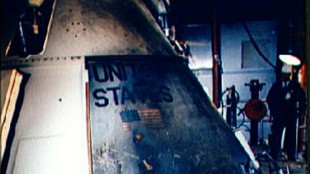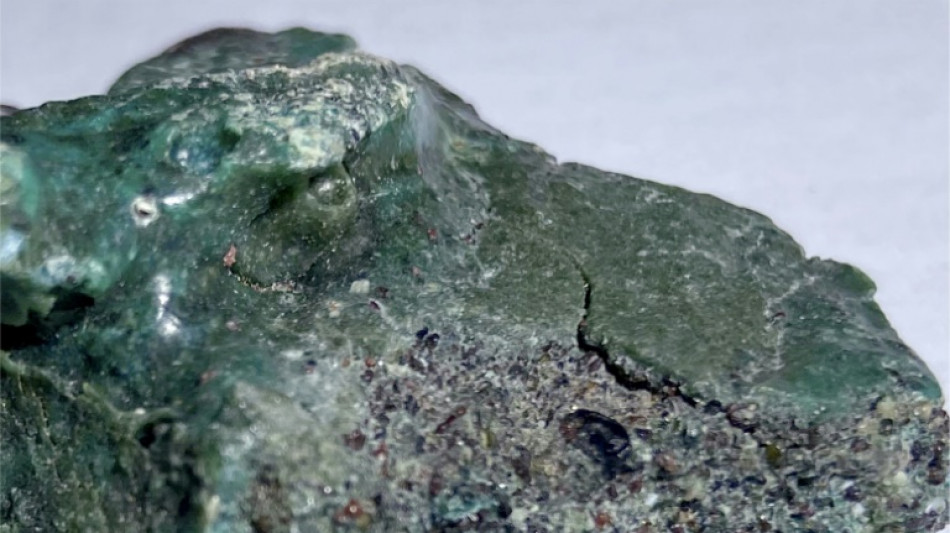
-
 Five things to know about Uganda
Five things to know about Uganda
-
Uganda votes under internet blackout and police crackdown

-
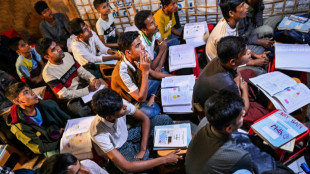 Dreams on hold for Rohingya children in Bangladesh camps
Dreams on hold for Rohingya children in Bangladesh camps
-
Canada's Carney in Beijing for trade talks with Chinese leaders

-
 All Blacks fire coach Robertson less than two years before World Cup
All Blacks fire coach Robertson less than two years before World Cup
-
Long-awaited EU-Mercosur trade pact set for signing
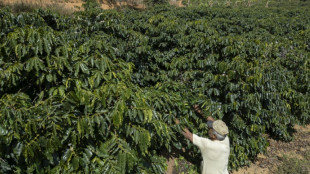
-
 Trump embraces AI deepfakes in political messaging
Trump embraces AI deepfakes in political messaging
-
A year of Trump: US health policy reshaped in RFK Jr's image

-
 One year in, Trump shattering global order
One year in, Trump shattering global order
-
Hit TV show 'Heated Rivalry' a welcome surprise for gay hockey community

-
 Spanish singer Julio Iglesias prepares defence against abuse allegations: Hola! magazine
Spanish singer Julio Iglesias prepares defence against abuse allegations: Hola! magazine
-
Actor McConaughey seeks to patent image to protect from AI

-
 Musk's Grok barred from undressing images after global backlash
Musk's Grok barred from undressing images after global backlash
-
Hosts Morocco set up Senegal AFCON final showdown

-
 Trump says Iran killings stopped, Tehran says 'no plan for hanging'
Trump says Iran killings stopped, Tehran says 'no plan for hanging'
-
Chelsea paid for costly errors in Arsenal defeat, says Rosenior

-
 Morocco beat Nigeria on penalties to reach Africa Cup of Nations final
Morocco beat Nigeria on penalties to reach Africa Cup of Nations final
-
Golden Globes viewership shrinks again

-
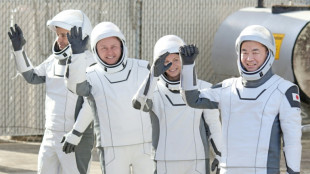 Astronauts leave ISS in first-ever medical evacuation
Astronauts leave ISS in first-ever medical evacuation
-
NASA reports record heat but omits reference to climate change

-
 Trump praises 'terrific' new Venezuela leader after call
Trump praises 'terrific' new Venezuela leader after call
-
Real Madrid crash out of Copa del Rey at Albacete on Arbeloa debut

-
 Trump says Iran killings stopped as US scales back Qatar base
Trump says Iran killings stopped as US scales back Qatar base
-
Arsenal beat Rosenior's Chelsea in League Cup semi first leg

-
 US stocks fall again as Iran worries lift oil prices
US stocks fall again as Iran worries lift oil prices
-
Inter extend Serie A lead to six points after Napoli slip

-
 Bayern beat Cologne to move 11 points clear in Bundesliga
Bayern beat Cologne to move 11 points clear in Bundesliga
-
Mane takes Senegal past Egypt into final of his last AFCON

-
 Trump says Greenland will 'work out' after Denmark fails to bridge gap
Trump says Greenland will 'work out' after Denmark fails to bridge gap
-
'Bridgerton' premieres in Paris promising 'Cinderella with a twist'

-
 California begins probe of Musk's Grok over sexualized AI images
California begins probe of Musk's Grok over sexualized AI images
-
Astronauts set to leave ISS in first-ever medical evacuation

-
 Napoli's stalemate with Parma opens door for Serie A leaders Inter
Napoli's stalemate with Parma opens door for Serie A leaders Inter
-
Syrian leader urges Kurdish integration as army sends troops east of Aleppo

-
 Denmark says White House talks failed to alter US designs on Greenland
Denmark says White House talks failed to alter US designs on Greenland
-
Venezuela looking to 'new era' after Maduro ouster, says interim leader

-
 Mane takes dominant Senegal past Egypt into AFCON final
Mane takes dominant Senegal past Egypt into AFCON final
-
UK police admit 'mistakes' over Maccabi Tel Aviv fan ban

-
 Promoter says Joshua will return to ring when 'time is right' after horror crash
Promoter says Joshua will return to ring when 'time is right' after horror crash
-
California investigating Grok AI over lewd fake images

-
 Wales's Faletau set to miss bulk of Six Nations
Wales's Faletau set to miss bulk of Six Nations
-
Denmark, Greenland wrap up crunch White House talks
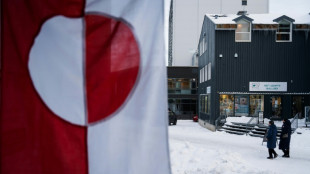
-
 England sweating on Fin Smith's fitness for Six Nations opener
England sweating on Fin Smith's fitness for Six Nations opener
-
NASA acknowledges record heat but avoids referencing climate change

-
 England rugby league coach Wane quits role
England rugby league coach Wane quits role
-
Oil prices extend gains on Iran worries

-
 European basketball pioneer Schrempf lauds 'global' NBA
European basketball pioneer Schrempf lauds 'global' NBA
-
Denmark, Greenland in crunch White House talks as Trump ups pressure
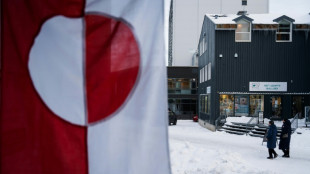
-
 Mitchell hits ton as New Zealand down India to level ODI series
Mitchell hits ton as New Zealand down India to level ODI series
-
Syrian army tells civilians to stay away from Kurdish positions east of Aleppo


Scientists make 'disturbing' find on remote island: plastic rocks
There are few places on Earth as isolated as Trindade island, a volcanic outcrop a three- to four-day boat trip off the coast of Brazil.
So geologist Fernanda Avelar Santos was startled to find an unsettling sign of human impact on the otherwise untouched landscape: rocks formed from the glut of plastic pollution floating in the ocean.
Santos first found the plastic rocks in 2019, when she traveled to the island to research her doctoral thesis on a completely different topic -- landslides, erosion and other "geological risks."
She was working near a protected nature reserve known as Turtle Beach, the world's largest breeding ground for the endangered green turtle, when she came across a large outcrop of the peculiar-looking blue-green rocks.
Intrigued, she took some back to her lab after her two-month expedition.
Analyzing them, she and her team identified the specimens as a new kind of geological formation, merging the materials and processes the Earth has used to form rocks for billions of years with a new ingredient: plastic trash.
"We concluded that human beings are now acting as a geological agent, influencing processes that were previously completely natural, like rock formation," she told AFP.
"It fits in with the idea of the Anthropocene, which scientists are talking about a lot these days: the geological era of human beings influencing the planet's natural processes. This type of rock-like plastic will be preserved in the geological record and mark the Anthropocene."
- Island paradise -
The finding left her "disturbed" and "upset," said Santos, a professor at the Federal University of Parana, in southern Brazil.
She describes Trindade as "like paradise": a beautiful tropical island whose remoteness has made it a refuge for all sorts of species -- sea birds, fish found only there, nearly extinct crabs, the green turtle.
The only human presence on the South Atlantic island is a small Brazilian military base and a scientific research center.
"It's marvelous," she said.
"So it was all the more horrifying to find something like this -- and on one of the most ecologically important beaches."
She returned to the island late last year to collect more specimens and dig deeper into the phenomenon.
Continuing her research, she found similar rock-like plastic formations had previously been reported in places including Hawaii, Britain, Italy and Japan since 2014.
But Trindade island is the remotest place on the planet they have been found so far, she said.
She fears that as the rocks erode, they will leach microplastics into the environment and further contaminate the island's food chain.
- 'Paradigm shift' -
She and her team's study, published in September in the journal Marine Pollution Bulletin, classified the new kind of "rocks" found worldwide into several types: "plastiglomerates," similar to sedimentary rocks; "pyroplastics," similar to clastic rocks; and a previously unidentified type, "plastistones," similar to igneous rocks formed by lava flow.
"Marine pollution is provoking a paradigm shift for concepts of rock and sedimentary deposit formations," her team wrote.
"Human interventions are now so pervasive that one has to question what is truly natural."
The main ingredient in the rocks Santos discovered was remnants of fishing nets, they found.
But ocean currents have also swept an abundance of bottles, household waste and other plastic trash from around the world to the island, she said.
Santos said she plans to make the topic her main research focus.
Trindade "is the most pristine place I've ever seen," she said.
"Seeing how vulnerable it is to the trash contaminating our oceans shows how pervasive the problem is worldwide."
K.AbuDahab--SF-PST

